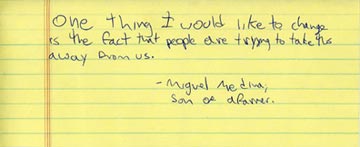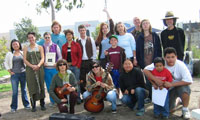Spreading self-authority
M.Y. Manifesto Workshop at the South Central Farms
Matt Dunnerstick
The boats sail across the Pacific Ocean to Long Beach Harbor where workers unload their cargo, sending the goods by rail up the California coastline and into the Los Angeles warehouse district of concrete and guard dogs. There, in a small pocket of shade and crickets, an anomalous fourteen acres of farmland existed. It was called the South Central Farm—the largest urban garden in the United States, a non-profit tilled by over 350 low-income families. Due to closed-door deals between a wealthy landowner and his political allies, families were being forced out. In its place was to come another new warehouse, leased by Wal-Mart, that great purveyor of plastic objects from the East.
Many of us visited the farm wanting to see and help. We walked under the stars, hearing train whistles and owls, feeling tranquility and sadness, and were moved to find that our sensation was shared, as if it proved absolute truth were possible. It became clear that every neighborhood in every town must have a community garden like this. In early 2006, the struggle of the South Central Farmers was the center of international grassroots activism. An energy prevailed that this was the cause to support. The outcome was clear: either farm or no farm.
Haruko Tanaka and I wanted to promote self-authority and encourage everyone to write manifestos. In early 2006, we wrote the M.Y. Manifesto manifesto to proclaim this. It seemed natural that a manifesto workshop should follow.
After we had attended a few farm meetings and candlelight vigils we approached the organizing committees with our idea to throw a manifesto workshop and fundraiser. They agreed. A manifesto workshop fit into their vision of the farm as a community center. Growing food, fighting alongside the farmers, and writing became inextricably linked.
We promoted the event through friends, street fliers, the farm, and community event sections in newspapers. KPFK also plugged us during the Pocho Hour of Power. The M.Y.Manifesto workshop was to be first and foremost a workshop.
On a sunny Sunday, Emily Lacy and Heather Lockie played guitar and violin as 23 people settled to our picnic tables after visiting the farm, eating lunch or vegetables from the farmers. Our crowd was composed of artists, activists, mystics, a nuclear family, children of the farmers, and those who just wandered in. A reporter from La Opinión showed up, others observed from a distance. The creative atmosphere was enhanced by the political urgency of the farm, and I opened with a speech called "Invoking the Spirit of 76" to aid the transition into a revolution of ideas.The first hour was spent covering manifestos, and the second writing manifestos.
Writing a manifesto can be scary. It puts your secret ideas behind a megaphone. Family, friends, business people, government employees, and the pastor at church may read it and judge you. Furthermore, for some people manifestos are the works of radical and dangerous people. We wanted to ease the stigma. In our promotional materials we advertised “Manifestos are not only for Karl Marx, Valerie Solanas, Ghandi, and the Unabomber.” To help people begin thinking about their own manifesto, and to help break the ice, we asked the workshop to write on a slip of paper what they wanted to change. We anonymously drew each other’s changes from a hat and read them aloud
Group Photo of M.Y. Manifesto Project Participants (click image to enlarge)

With such a variety of people (most of whom would not normally gather in the same space) we gained a broader more empathetic understanding of our dreams. Changes included "I would like to go from a place of never-ending distraction to one of constant awareness," "Redistribution of political power," and the quote in the picture above from the twelve-year old boy who signed his name. I remember commenting, “We all want fairness and awareness. How can it be that we have so many problems?”
Since it was a technical workshop, we separated fifteen different manifestos into forms and tones. Our idea was to use these metrics as a model, blur, and then discard. Our page syllabus spanned many colors and genders over the past 500 years. I also read a manifesto that I'd written years ago called the CAPitALLism Manifesto, hoping my anecdotes would mitigate their own fears and make writing feel more accessible.
Finally, the group read aloud from the M.Y.Manifesto manifesto, which Haruko and I released that day to motivate manifesto writing. Emily and Heather played some more tunes as the class turned into authors. At the end, Haruko and I sat and listened to those who wanted to read their drafts. A dad read his “Practice Manifesto” about baseball, a radio DJ explained his ideas on rules, and a musician read his spiritual and political synthesis. Three manifestos were given back to us and we’ve published them on our website in entirety. We took a photo of those of us who stayed to the finish, and the remainder of the day passed in new reflection on the Spirit of ´76.
The police raided the farms on Monday, June 12th. Fifty people were arrested, most famously actress Daryl Hannah, who had been holding a hunger strike in a tree on the farm. Bulldozers began demolishing immediately. Haruko was there and she called me on her cell phone. I wanted to join, and took my motorcycle to better weave through traffic and barricades, but the police had it surrounded. I looked up to the sky and watched a fleet of helicopters circle in the distance.
Although we failed in our larger objective of stopping the quasi-legal actions of one wealthy landlord, as of early 2007, the farmers have since regrouped and are in the process of creating new farmland. We hoped our M.Y.Manifesto would will spread self-authority through a new age of manifesto writing, and still do hope this.
M.Y. Manifesto: www.m-y-manifesto.net
SC Farmers: www.southcentralfarmers.com

